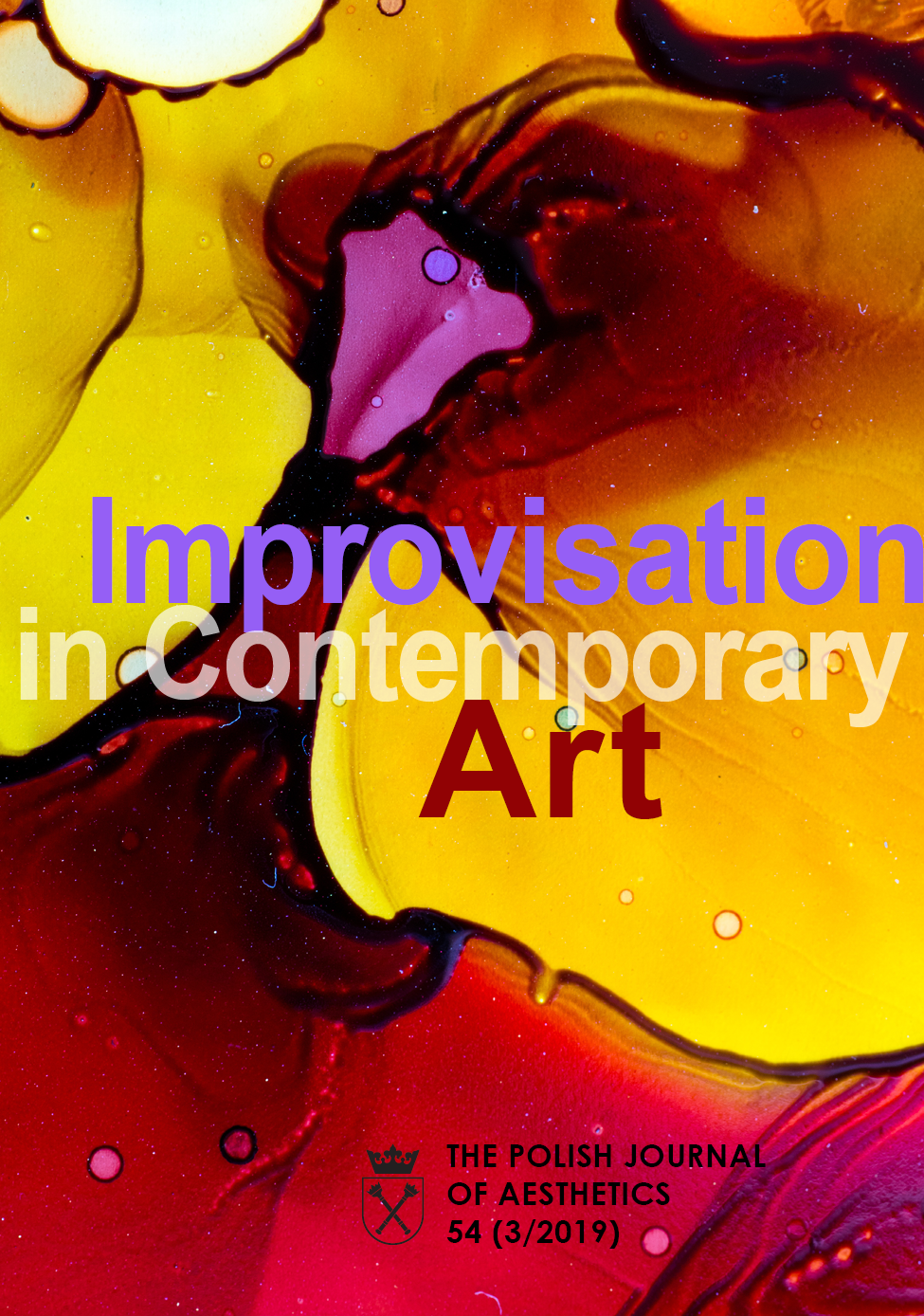Numer 54 (3/2019)
Improvisation in Contemporary Art|
Spis treści
Strony
Pobierz
|
|||||
|
Alessandro Bertinetto
Musical Authenticity as ‘Being True to the Moment’
DOI: 10.19205/54.19.1
9 – 28
|
|||||
|
Słowa kluczowe Musical Authenticity |improvisation |Musical Expressiveness |Musical Performance |Artistic NormativityStreszczenie In this paper I argue that the specific musical authenticity of improvisation in different kinds of music (especially, but not only, in Jazz and Free improvisation practices) consists of what I call ‘being true to the moment’ and that since the artistic success of every musical performance requires performers’ attentiveness and responsiveness to the moment of the performance, improvisational authenticity is the epitome of musical authenticity. I proceed as follows. Firstly I present Peter Kivy’s plural view of musical authenticity and discuss Julian Dodd’s view of musical improvisation as essentially inauthentic. Then, I articulate two notions of improvisational authenticity, ontological and expressive authenticity, which I develop by means of a third, and crucial, notion of improvisational authenticity: truthfulness to the moment, which is the specific way improvisation realizes a fourth kind of authenticity: artistic authenticity. Finally, I argue that improvisational authenticity is paradigmatic for the authenticity of musical performance as performance. INFORMACJE O AUTORZE
Università degli Studi di Torino, Włochy
|
|||||
|
Tracy McMullen
Jason Moran’s Staged: Improvisational Blurring and the Boundaries of Conceptual Art
DOI: 10.19205/54.19.2
29 – 45
|
|||||
|
Słowa kluczowe improvisation |Conceptual Art |Jason Moran |jazz |raceStreszczenie I examine jazz pianist Jason Moran’s conceptual artwork, Staged (2015/18), in order to interrogate the intersection between improvisation and contemporary art. Enlisting and expanding upon George Lewis’s coinage and theorization of Afrological and Eurological practices, I outline discourses that have coded improvisation as embedded in tradition, the “known,” and history, and conceptual art (as a form of “contemporary art”) as free from these. Staged brings these discourses into collision and offers new directions for contemporary art through its jazz improvisatory sensibility. INFORMACJE O AUTORZE
Bowdoin College, USA
|
|||||
|
Abolfazl Mohammadi
Autopoietic Free Improvisation vs. Technototalitarian Regulation of Consciousness
DOI: 10.19205/54.19.3
47 – 64
|
|||||
|
Słowa kluczowe improvisation |Anti-representational Art |Neuroscience |Self-objectivization |consciousness |Technototalitarianism |AutopoiesisStreszczenie The elusive nature and the function of art occupy a highly contested territory within aesthetic philosophy since its inception. The present article also engages with the question of the nature and the function of art, though in a more narrowed and specific domain. The claim that is going to be tackled here is whether improvisation in art, in general, makes a statement against empirical science? To corroborate this claim I will look at specific artworks that offer a way of considering the function of art as something that can stand in opposition to empirical science and as something that therefore can offer an alternative understanding of consciousness. The main question is, “where does improvisation stand against the radical evolutionary positivist objectivization of consciousness?” To answer, we look at the emancipatory role of art that challenges the empiricism of modern science via investigating several artworks as signposts. We examine different types of improvisation by analyzing Joe Wight’s Darkest Hour (2017) and by drawing on the concept of autopoiesis, we define autopoietic improvisation as free improvisation. Then we draw on Charlie Brooker’s Black Mirror show (2011–present) to indicate that the idea of how indelible techno-totalitarianism, which envisages a dystopian future for mankind via the refinement and regulation of consciousness, offers a limited view of consciousness. Techno-totalitarianism stands as a key term to be defined and analyzed here as it is precisely the mechanism against and through which I will shape a new discourse of improvisation. Techno-totalitarianism is the state of digital rationalization and instrumentation of neuroscience in the regulation of human desire, choice, and behavior such as regulation and self-regulation are no longer distinguishable. We also discuss how finding a theory of everything and complete formula for consciousness means cutting new alleyways to utter annihilation of human will, improvisation or freedom in general. INFORMACJE O AUTORZE
Uniwersytet Teherański, Iran
|
|||||
|
Steve Odin
Nichiren Buddhism in the Contemporary Jazz Improvisation of Herbie Hancock & Wayne Shorter
DOI: 10.19205/54.19.4
65 – 79
|
|||||
|
Słowa kluczowe improvisation |jazz |Aesthetics |nihilism |Value Creation |Aesthetic Value |beauty |Novelty |Variations |Spontaneity |Extemporaneity |Japanese Philosophy |Buddha Nature |Unlimited Possibilities |Multiple New Perspectives |Nichiren Buddhism |Lotus Sutra |Tendai Buddhism |Soka Gakkai InternationalStreszczenie This essay explains how Nichiren Buddhist philosophy and practice of Soka Gakkai International (SGI) in Japan inspired the contemporary jazz improvisation of musical legends Herbie Hancock and Wayne Shorter. The essay concludes with the jazz aesthetics of spontaneous musical improvisation formulated by Herbie Hancock and Wayne Shorter based on the Nichiren Buddhist theory and practice of “value creation” by tapping our Buddha nature as the source of infinite creative possibilities. INFORMACJE O AUTORZE
University of Hawai’i at Mānoa, USA
|
|||||
|
|
|||||

